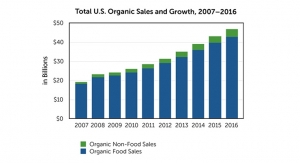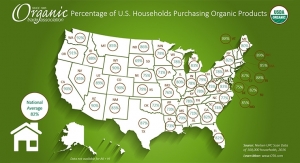07.01.10
Evidence suggests a lack of nutrition-related health benefits derived from organic foods, according to an article published in the American Journal of Clinical Nutrition. Researchers sought to assess the strength of evidence that nutrition-related health benefits could be attributed to the consumption of foods produced under organic farming methods. For this systematic review of published literature, researchers searched PubMed, ISI Web of Science, CAB Abstracts and Embase between January 1, 1958 and September 15, 2008 (and updated until March 10, 2010); contacted subject experts; and hand-searched bibliographies. They included peer-reviewed articles with English abstracts if they reported a comparison of health outcomes that resulted from consumption of, or exposure to, organic compared with conventionally produced foodstuffs. From a total of 98,727 articles, researchers identified 12 relevant studies. The results of the largest study suggested an association of reported consumption of strictly organic dairy products with a reduced risk of eczema in infants, but the majority of the remaining studies showed no evidence of differences in nutrition-related health outcomes that result from exposure to organic or conventionally produced foodstuffs. Given the paucity of available data, the heterogeneity of study designs used, exposures tested and health outcomes investigated, no quantitative meta-analysis was justified, researchers concluded.
Meanwhile, more than 83% of “foodies” say they’ll pay more for at least some organic or all-natural foods, according to a recent survey from Healthbuzz, a resource for nutrition and wellness information launched by Foodbuzz, an online food community. Knowing where food comes from and what goes into the foods we eat was an important trend in the survey results. For example, 69% of foodies surveyed “always” read the nutrition panels of foods that they purchase. In addition, the majority of foodies surveyed (83%) believe locally grown food to be generally healthier. The importance of a food’s source is also significant when foodies dine out. An overwhelming 96% of foodies like knowing where a restaurant’s food comes from, which is underscored by the increasing number of restaurants including this type of information on their menus. “From nutrition labels to restaurant menus, our research shows that people, now more than ever, are looking for information that reassures them that they are making informed choices about food, nutrition and overall wellness,” said Ryan Stern, director of community and managing editor of Foodbuzz.
Meanwhile, more than 83% of “foodies” say they’ll pay more for at least some organic or all-natural foods, according to a recent survey from Healthbuzz, a resource for nutrition and wellness information launched by Foodbuzz, an online food community. Knowing where food comes from and what goes into the foods we eat was an important trend in the survey results. For example, 69% of foodies surveyed “always” read the nutrition panels of foods that they purchase. In addition, the majority of foodies surveyed (83%) believe locally grown food to be generally healthier. The importance of a food’s source is also significant when foodies dine out. An overwhelming 96% of foodies like knowing where a restaurant’s food comes from, which is underscored by the increasing number of restaurants including this type of information on their menus. “From nutrition labels to restaurant menus, our research shows that people, now more than ever, are looking for information that reassures them that they are making informed choices about food, nutrition and overall wellness,” said Ryan Stern, director of community and managing editor of Foodbuzz.



















